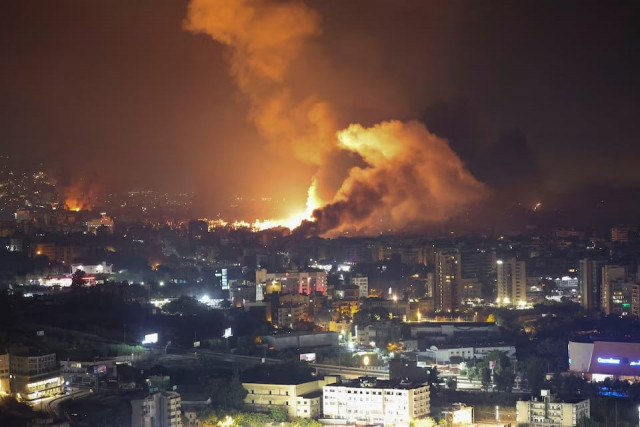Israel claims another senior Hezbollah official killed after Nasrallah assassination
Israeli military announces killing of Nabil Qaouq, member of Hezbollah’s central council in a strike on Saturday

Israel said on Sunday that it killed another senior Hezbollah official in an air strike on the Lebanese capital after assassinating its leader, Hassan Nasrallah.
Israel announced the killing of Nabil Qaouq, a member of Hezbollah’s central council in a strike Saturday, adding that its air force continued to hit “dozens” more targets around Lebanon on Sunday.
Israeli strikes have in recent months decimated Hezbollah’s senior command structure, with Nasrallah’s right-hand man Fuad Shukr, head of the elite Radwan Force Ibrahim Aqil and others among the dead.
The past week’s waves of strikes on Hezbollah strongholds around Lebanon have also plunged the tiny Mediterranean country and the wider region into fear of even more violence to come.
Hezbollah launched low-intensity cross-border strikes on Israeli troops after its Palestinian ally Hamas staged its unprecedented attack on Israel on October 7, sparking the war in the Gaza Strip.
Nearly a year later, Israel announced a shift in its focus to battling Hezbollah on its northern front.
Hezbollah confirmed Nasrallah’s killing in a massive strike on Friday on the group’s main bastion in south Beirut.
“We all started crying,” Maha Karit told AFP in Beirut after Nasrallah’s death.
With Lebanon already mired in political and economic crisis, the escalation has pushed it to the brink, as the bombardment has killed over 700 people in a week, according to health ministry figures.
The Israeli military said on Sunday its air force had struck “dozens of Hezbollah targets” after carrying out “hundreds” of strikes on Friday and Saturday.
It then announced that Qaouq was “struck and eliminated” in a strike on south Beirut on Saturday.
Hezbollah has yet to officially announce Qaouq’s death but a source close to the group said he had been killed.
Lebanon’s National News Agency reported a string of raids in and around the city of Baalbek in the east.
At least six people were killed in a strike on a house in the northeastern Hermel region, the agency reported, while an emergency response group affiliated with Hezbollah ally the Amal movement said five of its rescuers were killed in the south.
Hezbollah said its fighters launched “a volley of Fadi-1” rockets at an Israeli base in the Golan Heights early Sunday. The Israeli military reported “approximately eight” launches from Lebanon that fell in unpopulated areas near the Israeli-annexed territory.
Cult status
Nasrallah was the face of Hezbollah, enjoying cult status among his supporters.
Prime Minister Benjamin Netanyahu said Israel had “settled the score” with Nasrallah’s killing, while Israeli military spokesman Daniel Hagari said the world was “a safer place” without him.
US President Joe Biden – whose government is Israel’s top arms supplier – said it was a “measure of justice for his many victims”.
Analysts told AFP that Nasrallah’s death leaves bruised Hezbollah under pressure to respond.
“Either we see an unprecedented reaction by Hezbollah… or this is total defeat,” said Heiko Wimmen of the International Crisis Group think tank.
he assassination also showcased Israel’s military and intelligence prowess.
“It demonstrates… just how deeply Israel has penetrated Hezbollah,” said James Dorsey of Singapore’s S. Rajaratnam School of International Studies.
Hezbollah has condemned Nasrallah’s assassination, with First Vice President Mohammad Reza Aref threatening it would bring about Israel’s “destruction”.
On Sunday, Iran’s Foreign Minister Abbas Araghchi also vowed that the killing of its Revolutionary Guards general Abbas Nilforoushan alongside Nasrallah would “not go unanswered”.
Hamas condemned Nasrallah’s killing as a “cowardly terrorist act”, while Lebanon, Iraq, Iran and Syria all declared public mourning.
Allied armed groups across the region like Yemen’s Houthi rebels, already drawn into the Gaza war, have vowed action against Israel.
An “unmanned aerial target” approaching Israel over the Red Sea – where the Houthis have launched attacks before – was intercepted on Sunday, the Israeli military said. There was no immediate claim of responsibility.
‘Breaking point’
Most of the deaths in Lebanon came on Monday, the deadliest day of violence since the country’s 1975-1990 civil war.
UN refugee chief Filippo Grandi said “well over 200,000 people are displaced inside Lebanon” and more than 50,000 have fled to neighbouring Syria.
Lebanese Prime Minister Najib Mikati however warned the figure could be much higher, saying up to one million people may have been forced from their homes.
It was potentially the “largest displacement movement” in the country’s history, he said.
The World Food Programme said it had launched an emergency operation to provide meals and support for “up to one million people” affected by the escalation.
“Lebanon is at a breaking point and cannot endure another war,” said WFP regional director Corinne Fleischer.
Diplomats have said efforts to end the war in Gaza were key to halting the fighting in Lebanon and bringing the region back from the brink.
In Gaza, AFP correspondents reported several air strikes during the night and shelling from a navy boat.
Civil defence spokesman Mahmud Bassal said an Israeli strike killed at least three Palestinians in a house in Gaza City, with three more killed in two separate strikes in the territory’s north and centre.
Hamas’s October 7 attack on Israel resulted in the deaths of 1,205 people, mostly civilians, according to an AFP tally based on Israeli official figures that include hostages killed in captivity.
Of the 251 hostages seized by the Palestinian group, 97 are still held in Gaza, including 33 the Israeli military says are dead.
Israel’s retaliatory military offensive has killed at least 41,595 people in Gaza, most of them civilians, according to figures provided by the Hamas-run territory’s health ministry. The UN has described the figures as reliable.



















COMMENTS
Comments are moderated and generally will be posted if they are on-topic and not abusive.
For more information, please see our Comments FAQ